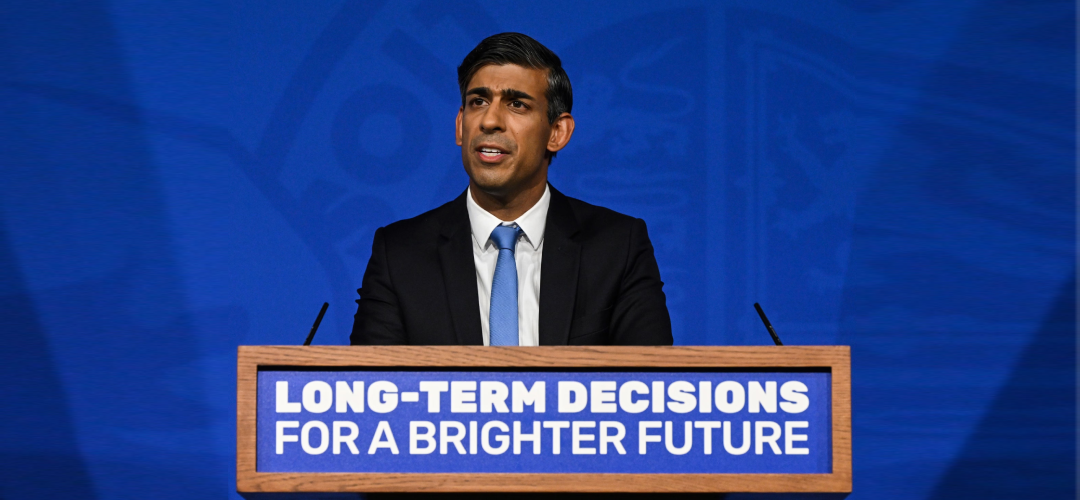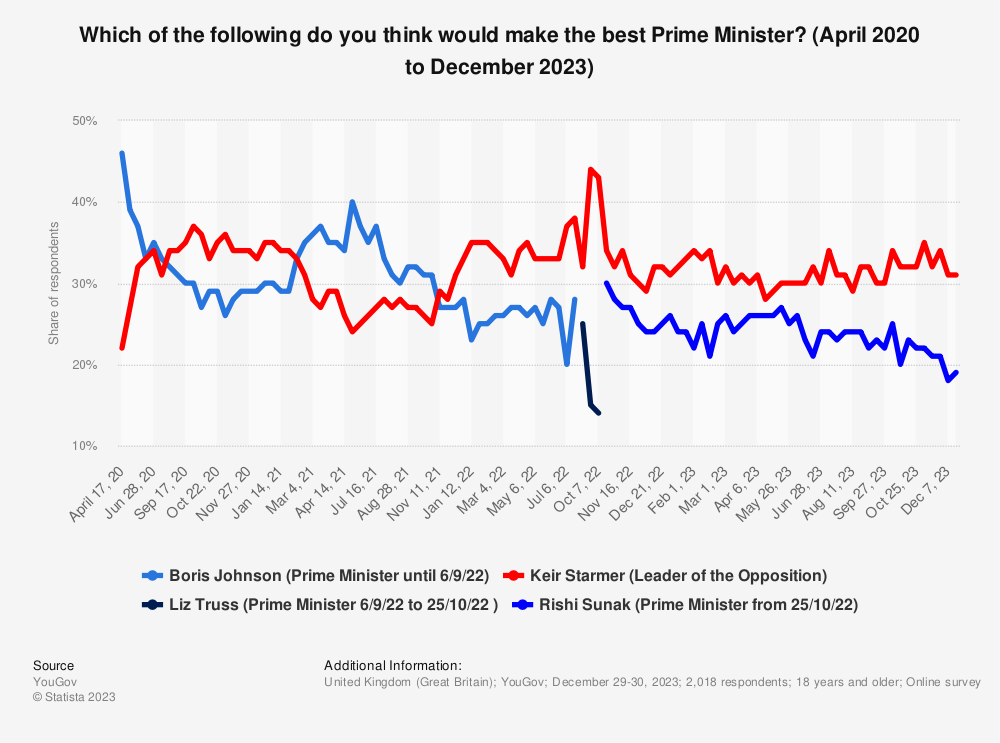UK: A Gathering Storm?
December 16, 2023 | Expert Insights

Prime Minister Rishi Sunak would have heaved an audible sigh of relief as the highly controversial Rwanda Bill passed through the first constitutional hurdle before it becomes a law. The legislation aims to overcome concerns raised by the Supreme Court, which ruled last month that the previous policy for deporting people to Rwanda violated domestic and international law.
The United Kingdom's political landscape is currently experiencing significant turbulence, with the highly controversial Rwanda immigration policy serving as a major focal point. Prime Minister Rishi Sunak's attempt to revive this plan, which the Supreme Court previously deemed illegal, has exposed deep divisions within his Conservative Party and potentially jeopardized his leadership.
Some Tories who opposed the bill had threatened to vote against it, but, in the end, none did, and the bill passed the Commons by a comfortable 313 vote against 269. Former Immigration Minister Robert Jenrick, who had resigned last week in protest over the bill and former Home Secretary, Indian-origin Suella Braverman, who was sacked last month for her incendiary opinion piece published in the media, abstained from the vote.
On the background of all this, there are muted murmurs of Mr Boris Johnson mounting a comeback.
Background
The Rwanda Plan, officially known as the UK and Rwanda Migration and Economic Development Partnership, aims to send asylum seekers arriving in the UK to Rwanda for processing and potential resettlement. This policy, driven by Sunak's promise to "stop the boats" carrying unauthorised migrants across the English Channel, has been met with substantial opposition, both domestically and internationally.
Critics argue that the plan is inhumane, unethical, and ultimately unworkable. They point to Rwanda's questionable human rights record and the logistical difficulties of implementing such a complex scheme. Additionally, they question the deterrent effect of the plan.
Despite the criticism, Sunak remains committed to the Rwanda plan, viewing it as a crucial measure to regain control over immigration and appease conservative voters. He has presented the recent treaty with Rwanda as a solution to the legal issues that previously hampered the programme. However, this treaty has further fuelled the controversy, with concerns that it may weaken safeguards for human rights.

Analysis
The Rwanda immigration policy, alongside other divisive issues like the aftermath of Brexit, has exacerbated existing divisions within UK society. This has led to an increasingly polarised political landscape, with both sides holding entrenched views and engaging in increasingly acrimonious discourse. This polarisation could manifest in a more intense and bitter election campaign, potentially discouraging voters from engaging with the political process. This disillusionment, coupled with dissatisfaction with the government's performance on key issues like the cost of living, could lead to lower voter turnout, particularly among younger generations who feel increasingly disconnected from the political process.
The recent by-elections in Mid Bedfordshire and Tamworth have seen Labour achieve historic victories, capturing seats that were once considered strongholds of the Conservative Party. These results have been interpreted as a significant shift in public sentiment, with voters expressing dissatisfaction with the government's performance on issues like the economy, cost of living, and immigration. The Labour Party, led by Keir Starmer, has capitalised on this discontent by presenting itself as a more credible and competent alternative to the Conservatives. Starmer has criticized the Rwanda plan as a "gimmick" and has pledged to focus on addressing the root causes of illegal immigration, such as conflict and poverty.
If the Rwanda bill is finally passed in the Parliament, it will significantly impact the UK's political future. A defeat for Sunak would be a major blow to his authority and could lead to calls for his resignation. This would further destabilise the Conservative Party and potentially trigger a leadership contest. If the bill passes, it will face legal challenges and likely delay the implementation of the Rwanda plan for months, if not years. This would provide the Labour Party with an opportunity to further strengthen its position and potentially gain momentum in the run-up to the next general election.
The current political environment in the UK is highly volatile and unpredictable. The Rwanda plan, Labour's recent victories, and the possibility of a leadership change within the Conservative Party all contribute to this uncertainty. The upcoming general election, which must be held by 2024, will ultimately determine the country's future direction.
The uncertainty and dissatisfaction with the status quo create fertile ground for the rise of populist movements and anti-establishment parties. These parties often capitalize on public anger and frustration, offering simple solutions to complex problems and appealing to voters who feel increasingly disenfranchised by the traditional political system. A significant rise in populist influence could potentially disrupt the established political order and lead to unpredictable outcomes in the upcoming elections.
While divisive issues like immigration and Brexit will undoubtedly feature prominently in the election campaign, it is likely that core issues like the cost of living, healthcare, education, and the economy will take centre stage. Voters are increasingly concerned about their daily lives and will likely base their voting decisions on which party presents the most credible and effective solutions to these pressing issues.
The ongoing war in Ukraine, the global economic downturn, and other international developments have significantly impacted the UK's political landscape. These events can influence voters' priorities, shape the government's agenda, and create opportunities for certain parties to capitalize on public anxieties and concerns.
Beyond the immediate political scenarios, the current situation raises broader questions about the future of immigration policy in the UK. Will the focus remain on deterrence and border control, or will there be a shift towards more humane and compassionate approaches? How will the UK manage the increasing pressures of migration in a globalized world? These are complex and challenging questions that will require careful consideration and a commitment to finding effective and ethically responsible solutions.
Despite being forced to resign earlier this year, Boris Johnson's shadow looms large over British politics. Recent reports suggest that he could be plotting a comeback, possibly even forming a new political party with Nigel Farage. Johnson's potential return would further complicate the political landscape and add another layer of uncertainty to the upcoming election. His supporters remain loyal, and his presence could energise the right-wing base, potentially splitting the Conservative vote and benefiting Labour.
Assessment
- The coming months will be critical for the UK's political future, especially that of its incumbent Indian-origin Prime Minister. The outcome of key votes, the performance of the government, and the potential entry of new players into the political arena will all determine the path the country takes in the years to come.
- Voters will be looking for candidates who clearly understand these complex issues and can effectively navigate the UK through a turbulent international landscape. The ability to articulate a coherent foreign policy vision and demonstrate competence in managing global affairs could be crucial in determining the election
- The choices voters make in the upcoming elections will have far-reaching consequences for the UK's future direction on issues such as immigration, the economy, and its role in the world. The question whether Sunak will still hold sufficient ground in the 2024 elections to retain power remains hanging in the air.








Comments